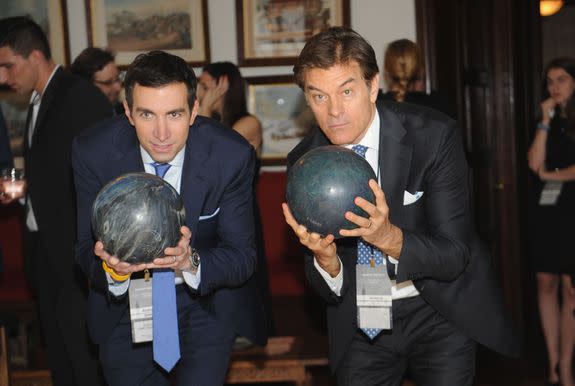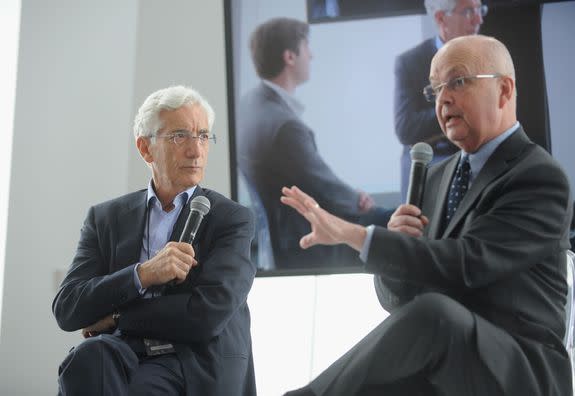Inside the exclusive, stealthy club where future tech moguls are born

I’m at a New York City heliport in a waiting room so packed with people that the obviously overwhelmed staff are struggling to move through the crowd to check everyone in. While the staff of Blade, the "Uber for helicopters" company, is used to a well-heeled crowd, the current group may be a bit over the top even by their standards.
Across Blade's three Manhattan heliports more than 200 people are boarding choppers bound for the Rockefeller Estate’s “playhouse,” a sprawling two-story building where members of the Rockefeller family still meet twice a year.
SEE ALSO: Facebook's 'Town Hall' is probably the best thing the social network has ever done
Only for this outing, it's not old New York money on the guest list, it's the darlings of Silicon Valley and their many admirers.
The Kairos Society's global summit attracts an eclectic mix of the wealthy, famous and powerful. Dr. Mehmet Oz, former CIA director Mike Hayden, Bobbi Brown, former Greek Prime Minister George Papandreou, Amazon CTO Werner Vogels, actor Joseph Gordon-Levitt (who played the title character in Snowden), Virgin Galactic CEO George Whitesides, Periscope founder Kayvan Beykpour, AOL CEO Tim Armstrong, Rent the Runway CEO Jennifer Hyman and former Mexican President Vicente Fox to name just a few.
There's a formal dinner (suggested attire: "cocktail casual") but before it starts the group has free rein to explore the winding halls of the playhouse and its many amenities. There's an indoor pool, tennis courts and a small two-lane bowling alley. It's not every dinner party where CNBC's Andrew Sorkin and Dr. Oz pickup an impromptu bowling session but tonight everyone is unfazed.

Image: Brad Barket/Getty Images for Kairos Society
Over three days in late April, the summit brings together promising young entrepreneurs, government leaders, investors and some of the most powerful executives in the country. Random encounters between the rich and powerful are just part of the scene.
Unlikely a mix though it is — Hayden was apparently a bit tense after meeting Levitt — everyone’s here because they’re somehow part of the extended network of the Kairos Society, an elite, under-the-radar group whose members describe themselves as the influential leaders of tomorrow.

Image: Getty Images for Kairos Society
Founded in 2008 by three Wharton undergrads, it began as a small group of ambitious friends who chose the startup life over careers in consulting or finance.
“It started off fairly simply: My friends and I were looking for other people like us who wanted to go start companies,” recalls Ankur Jain, the 27-year-old chairman of Kairos. “We saw, and we still believe, that these big problems, these social issues, it’s not just a social problem it really is a market opportunity.”
As the group grew, Jain says it became clear they would need the help of outside leaders — government officials and executives from the industries Kairos entrepreneurs were trying to break into — to succeed. So they began writing letters. Those letters led to the first event between Kairos members and business leaders in 2009.
Fast-forward to today and the group counts more than a thousand members in local chapters around the world, and more than 3,000 alumni.
But not just anyone can join. New members must first be recommended by someone they know. After that, there's an interview and rigorous application process. You also have to be under the age of 26.
This has helped keep the group somewhat under the radar, despite the organization's numerous high-profile connections.

Image: Brad Barket/Getty Images for Kairos Society
“It’s a highly selective program, really just identifying the best of the best from around the world,” says Jain, who's also the vice president of product at Tinder. “These entrepreneurs that we bring together are amongst the 50,000 or so people in our generation who are going to shape the world as we know it.”
It sounds like a lofty goal but the leaders of Kairos really believe they are finding that small group of world-changers.
"Can we say with some degree of confidence that this person might be part of that 50,000? We really want very, very innovative, people," explains Pieter Strydom, the regional president of Kairos Africa.
But once you're in the club, the benefits of Kairos membership are manifold.
Kairos fellows not only get access to advisors and mentors — they get an extended network of similarly minded friends. Kairos also recently started a venture fund to invest in startups that align the organization's vision to take on "today's big challenges."
“The network is a big thing. Kairos pretty much knows every big CEO, either directly or indirectly, in the world,” says Olivia Higgs, a Kairos fellow based in the U.K.
It's a model that's already produced quite a few promising young entrepreneurs. Notable alumni — you graduate from "fellow" to "alumni" after you turn 26 — include Periscope CEO Kayvon Beykpour and Caspr founder Neil Parikh. Companies with Kairos members in leadership positions have raised millions of dollars in funding for enterprises that, taken together, are valued at over $3 billion.
At this year's summit, there were fellows working on rocket-engine startups, biotech companies specializing in gene editing, augmented reality, genetic testing, and AI startups of all stripes.They hail from schools and countries around the world but they are all impressively driven.

Image: Brad Barket/Getty Images for Kairos Society
Many of them are raising money and striking deals with some of the most well-known companies in the world before they even graduate. There's even a small cohort of Thiel fellows, the program spearheaded by Peter Thiel that gives $100,000 to young entreprenurs who want to pursue a promising startup instead of college, who also count themselves among Kairos' ranks.
"There are a lot of networks out there where you get accepted based on intention and what you want to do," Strydom says. "Kairos is not like that at all. Kairos is based on traction not intention — what have you actually done, what have you achieved."
Of the current group of fellows, about 150 also attended the two-day Global Summit, which also invites alumni and select others from Kairos' vast networks. Following the opening dinner at the Rockefeller Estate, the event kicked off with an all-day meeting at the top of the World Trade Center where young Kairos fellows mingled with Silicon Valley investors, government leaders and the impressive collection of CEOs and other high-ranking executives.
There wasn't a strict agenda for the day but the business leaders and government types in the room took turns giving quick 3-minute talks — what Jain has described as a kind of "reverse Shark Tank" — pitching the budding entrepreneurs on problems they should tackle.

Image: Brad Barke/Getty Images for Kairos Society
Hayden, the former CIA director, spoke about the importance of bringing together big data with historical knowledge. Wall Street Journal Editor in Chief Gerard Baker and New York Times CEO Mark Thompson spoke on the issues facing today’s media industry. Amazon CTO Werner Vogels pitched fellows on the need for computing systems that can handle all the 6,000+ languages spoken in the world — not just the handful spoken in Western countries.
But ask some of the fellows what they like best and they won't dwell on those discussions. It's the "totally unexpected conversations that arose from being in such close proximity to some of the world’s most interesting and successful people," says Kelsea Crawford, a Paris-based Kairos fellow.
For Crawford, that meant running into Paul Cutsinger, the head of Amazon's Alexa Code Lab, on the way into the New York Stock Exchange (the site of day two of the Kairos Summit) and discussing whether they should buy Snapchat Spectacles from the Snapbot stationed near the entrance. (They both did.)
Gauging the long-term impact of a group like Kairos is a bit more difficult. The organization doesn't have a rigid structure and official meetings like the Global Summit are infrequent. And the fact that so many people become aware of the group through word of mouth also has its drawbacks. Like so many tech conferences, the Kairos Summit was a male-dominated affair, and this year's K50 — the top 50 Kairos fellow-lead startups selected by a group of advisors and investors as the best of the best — was almost entirely male. (Jain notes that globally, the organization is about 40 percent women.)
Ambition and high-profile connections aside, the fact remains most startups, even Kairos-backed ones, don't see long-term success. But Jain says it's less about any one startup that comes out of Kairos as much as it's the collective power of the group working on fixing these "broken industries."
"If I have something I want them [the fellows] to get out of it, it’s the best and brightest minds of our generation are not going into banking, consulting, they’re spending their time and their efforts and their life working on these critical issues."
